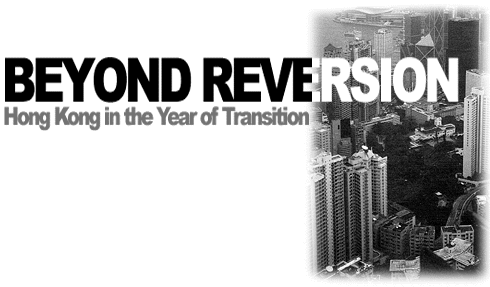
by Peter Koehn and Phyllis Bo-yuen Ngai
Here in Hong Kong, Special Administration Region of the People’s Republic of China, reaction to the country’s reversion to China last July has been subdued. The brilliant pomp and ceremony have been overshadowed by more sobering events - record annual rainfall, a dramatic slump in tourism and retail sales, bird flu and stock-market meltdowns. The People’s Liberation Army troops are practically invisible, reflecting the Chinese mainland’s low-profile approach to the resumption of sovereign responsibility for Hong Kong. Press coverage of events in China and the SAR continues to be open, and even critical; most journalists are surprised at the government’s restraint, but cautious about the future. And, according to a recent survey, 51 percent of the Hong Kong populace are satisfied with the provisional government.
 |
| Peter Koehn |
Tossed between East and West, a sparkling bridgehead in the southern industrial heart of mainland China, Hong Kong and its people are in the process of redefining their identity. While some Hong Kong residents are learning Putonghua - the most widely used form of spoken and written Chinese - the government is devoting resources to recruiting hundreds of additional English-language teachers for primary and secondary schools. Hong Kong’s managerial elite send their children to U.S. universities, establish business enterprises in Guangdong or Shanghai and live in luxurious flats overlooking Hong Kong’s Victoria Harbor.
In a reversal of pre-1997 migration trends, more people have returned to Hong Kong in the past year than have emigrated. Applications for resident visas are down sharply at the U.S., Canadian and Australian consulates. Hong Kong residents holding extended-validity visas (valid through 2001) are cashing them in. Many interpret this as a sign of renewed confidence among Hong Kong’s professionals. At the same time, more Americans now reside in the SAR than ever lived in the former British territory of Hong Kong.
Reversion: The View from Shanghai
This low-key response contrasts markedly with the official hoopla and drastic expectations that greeted the prospect of reversion in the weeks leading up to July 1, 1997. In Shanghai, a city of seventeen million people where we taught in 1996-97, giant red banners decorated buildings, billboards, street corners and metal sidewalk fences. Printed with white characters, one popular banner read, “More than one hundred years of national insults are to be washed away; let’s celebrate regaining sovereignty over Hong Kong.” For weeks, hotel lobbies, state-owned shops and university campuses displayed the countdown to July 1 in minutes - although the numbers frequently lagged behind the official figure on the electronic board in Tiananmen Square. At a Shanghai International Studies University seminar, foreign-language students read patriotic speeches extolling the virtues of Hong Kong’s return in a dozen different languages. A poster prepared by Department of International Trade students featured a realistic watercolor of the post-modern skyscrapers that fill Hong Kong’s central business district captioned by the blunt slogan, “From now on, what is yours will be ours.”
In the days leading up to July 1, Chinese television provided nonstop visual coverage from Beijing and Hong Kong of magnificent cultural performances, fireworks and British and Chinese pomp and ceremony - ranging from 17,000 workers and students presenting a five-stage dance in the Beijing Workers’ Stadium to Prince Charles’ speech referring to the “restoration of responsiblity for Hong Kong.”
In the midst of this media extravaganza, Shanghai’s unusually quiet streets reflected the faint joy of most of the people we interviewed. “The government is excited,” a university secretary told us, rolling her eyes. “But people are very calm.” A middle-aged bus driver offered a contrasting viewpoint: “China’s status in the world will be higher from now on as a result of Hong Kong’s return. With greater international respect and strength, other powers will be reluctant to hit on us.” A musician, who rehearsed day and night for weeks in preparation for her orchestra’s reversion performance in Beijing, explained that although “the return of Hong Kong should be a happy occasion,...deep down I don’t feel much.” Even the student organizer of an exhibit devoted to the reversion admitted that “the whole celebration we are participating in seems very distant to us.” This student found it shocking, nonetheless, that a friend in Guangzhou “looks forward to July 1 because she wants to have a day off to sleep.”
From Fireworks to Firings in Hong Kong
For most people in Hong Kong, the excitement surrounding July 1, 1997 - the world-class fireworks displays, concerts, cocktail parties and sporting events - have been overshadowed by political and economic concerns. In a survey conducted by the Hong Kong Transition Project in January 1998, 45 percent of Hong Kong residents indicated some worry about the political stability of Hong Kong (down from 58 percent in June 1997). A record 57 percent expressed concern about their standard of living.
The Year of the Tiger has not been a prosperous one for Asia’s “Little Tiger” economies. Many corporations are drastically downsizing, and unemployment is rising. In January, Phyllis taught an advanced English training course for sixteen Nike employees. Only two finished the ten-week course - the others had been laid off. The two who remained told her they would rather have been laid off in light of the additional workloads they now have to shoulder.
Nevertheless, the number of trainees (ranging from company secretaries to middle managers and experienced engineers) interested in enhancing their English-language skills through adult continuing education and open-university courses is on the rise. For many in the SAR, improving one’s skills is a hedge against political instability and rising unemployment.
Facing the Millenium
When we left Shanghai shortly after the handover, three questions struck us as crucial: How deeply will people in China be influenced economically, culturally and politically by the capitalist and Western-oriented “second” system that will exist in their midst for the next fifty years? How will Hong Kong’s people - who are experienced in interacting with peoples of other cultures - contribute their knowledge and skills to the development of China? In the new century, how successfully will Hong Kong weave networks between China and other countries, especially the United States?
Unraveling these issues is a long-term proposition for scholars, culture shapers and policy makers. However, judging from the past nine months, Hong Kong, as a special region of China, is positioned to play an even more decisive role than it had as a colonial territory. And its people and institutions are responding enthusiastically to this challenge.
During our Fulbright-sponsored year at the Hong Kong-America Center at the Chinese University of Hong Kong, we have been able, in a small way, to forge new connections between academics in the East and the West. At an international symposium that Peter organized on May 28-29, panelists from Hong Kong and the United States (including UM’s Otto Koester, Dennis O’Donnell and Mary Ellen Campbell) and two dozen prominent Chinese scholars discussed the outlook for relations between China and the United States. Unquestionably, the university’s attractive setting and Hong Kong’s SAR status were responsible for drawing such an exceptional number of mainland scholars.
On a date close to the first anniversary of Hong Kong’s reversion to China, President Bill Clinton will visit the SAR. As we write, the president’s advance team is in Hong Kong discussing details of this visit. There will be another media blitz, more speeches and festivities. But the symbolism will be revealing. Within one short year following reversion, Hong Kong is viewed with confidence in both Beijing and Washington as a vital and productive link in the blossoming friendship between China and the United States. M
Peter Koehn, a UM political science professor, is currently director of research and development at the Hong Kong-America Center and a visiting professor at the Chinese University of Hong Kong. Phyllis Bo-yuen Ngai, M.A. ’96, has been employed as a training consultant by the Hong Kong Polytechnic University’s Centre for Professional and Business English. Their twin boys, Justin Ngai-Tching and Jason Ngai-Szee, were born March 13, 1998.